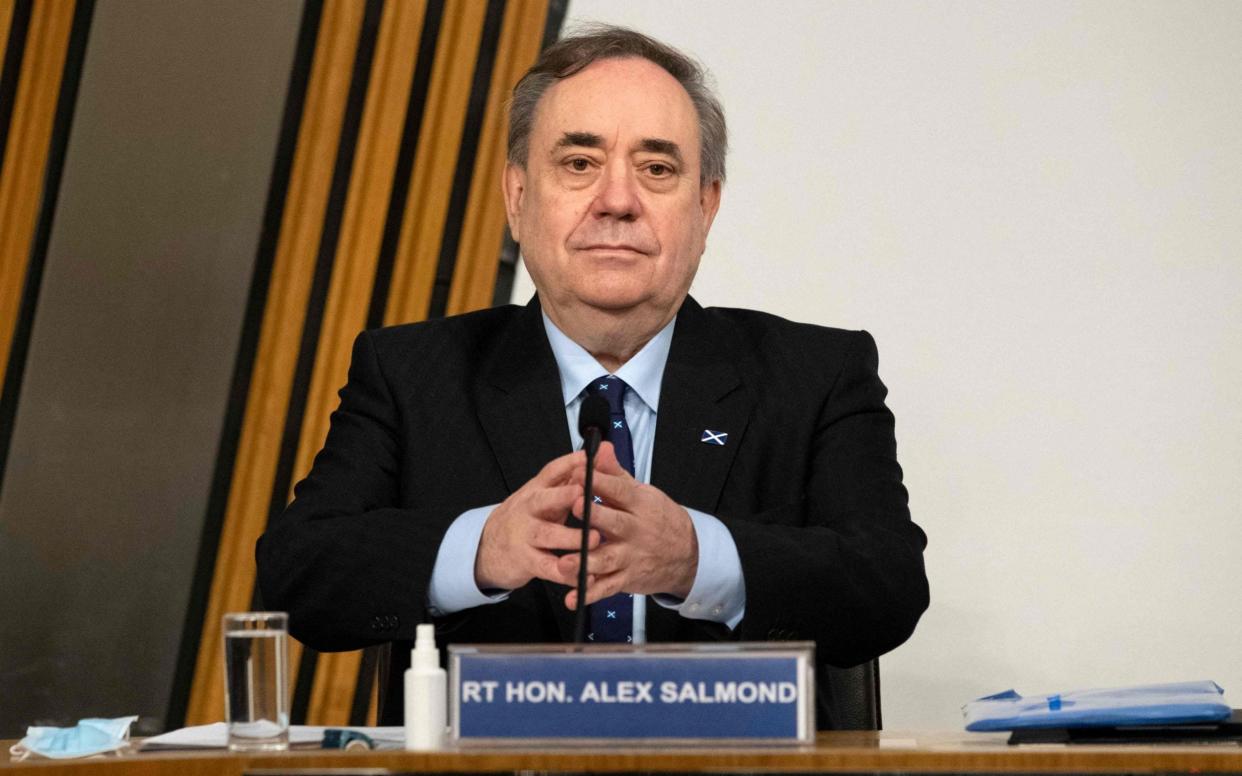Calm, controlled and forensic, Alex Salmond sought to finish off his protege, but it may well be voters who do the job

- Oops!Something went wrong.Please try again later.
Anyone who has the slightest doubt that we are witnessing the gory end of a fairly spectacular political phenomenon, namely the double-act of Alex Salmond and Nicola Sturgeon, couldn’t have caught even the briefest of snatches of his icily frank performance at Holyrood on Friday.
It’s over and so, too, must surely loom the love affair that much of the Scottish electorate appears to have had with Ms Sturgeon over the last year.
The diehards will stay but how can she keep normally non-nationalist voters, who defeated her in the 2014 referendum, and who’ve been won over by her daily television appearances in the battle against the Covid. And the polls suggest they might back her in an election in two months time and in any subsequent referendum.
But Salmond said on Friday that Ms Sturgeon wasn’t fit to run an independent country and that she had, without doubt, broken the ministerial code about what they knew and when of allegations - which he denied - against him of sexual assault.
He did believe that it was up to an independent inquiry - not him - to decide whether she should resign, but Salmond did rage against the fact that the Crown Office said that evidence could be published then subsequently said it should be ‘unpublished’. This was an issue that he believes should lead the Lord Advocate to ‘consider his position’, in other words submit his resignation.
Salmond said he had been the subject of a ‘witch hunt’ by people close to the First Minister, including Peter Murrell - Ms Sturgeon's husband - who had been contacting people to secure allegations against him.
And after a judicial inquiry into an investigation by the Scottish Government had found in his favour - costing the taxpayer over £500,000 - a senior government special advisor had told a colleague ‘We’ll get him in the criminal case’.
Salmond said that the Scottish Government had delayed settling the judicial review, even when they knew they’d lose, in the hope, he added, that the criminal case against him "would ride to the rescue like the cavalry coming over the hill".
In a display of all the forensic debating powers which once made him a power not just in Scottish, but UK, politics, Salmond sought to finish his former protege off as a political leader. He said that in spite of all the bad publicity the country had suffered in recent days. “Scotland hasn't failed, its leadership has failed."
He said he wanted Scotland to be independent, but he also wanted it to be somewhere with robust safeguards where citizens were not subject to “arbitrary authority” .
Wearing an SNP tie and lapel badge - he’s not now a party member - he kept mostly calm and controlled as he went carefully through a catalogue of what he said was a campaign against him.
Nobody should forget, as Sturgeon will undoubtedly make plain when she gives evidence next week, that the root of this incredible saga was allegations of sexual assault levelled against Salmond - claims he denied - by two civil servants.
And when members of the committee sought to question him about this episode he twice repeated the same mantra - namely that two judges and one jury had cleared him.
He did urge the committee to continue to get agreement to publish the censored evidence but in relation to his main ‘target’ - his successor as First Minister - Salmond said that while he hadn’t made any allegations against others that he couldn’t corroborate, for that reason he hadn’t made any specific allegation against Sturgeon.
However, in what sounded like a threat, he insisted that he was being prevented from disclosing evidence ‘way beyond’ what he’d so far been allowed to reveal.
But a question remains at the end of all of this, based on the evidence we heard on Friday. Namely, can voters really continue to say they retain confidence in Sturgeon when they understand that what they’re backing is a government that is besmirching not just the good name of important national institutions, but of Scotland itself?

